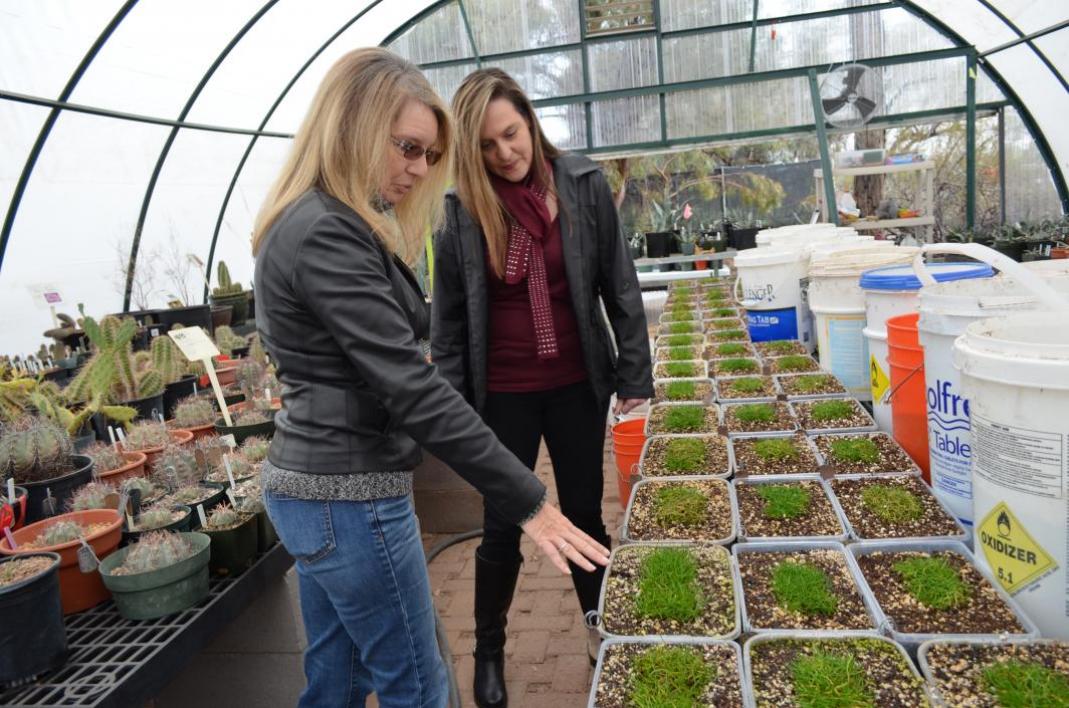New ASU master’s degree joins forces with Desert Botanical Garden to grow the pool of plant experts
Sept. 30, 2016- Written by Devan Philips
To address the shortage of plant experts, Arizona State University in partnership with Desert Botanical Garden recently launched a new master’s degree program in plant biology and conservation. The program is part of a national trend, where a leading botanical garden partners with a university’s biology department to offer unique teaching and hands-on research experiences.
ASU is on the cutting edge of that trend, joining forces with the Desert Botanical Garden to offer the new degree. Now, plant conservation may find some revitalized support!
“This seems like a real ‘win-win,’” said Kim McCue, co-director of the degree program and program director of Conservation of Threatened Species and Habitats at Desert Botanical Garden. “By having a university collaborate with a botanical garden, we have greater ability to train people in the botanical sciences, and we know firsthand that these people are worth training. We live in a unique ecosystem in the Southwest — the Sonoran Desert. It makes sense to offer a master’s degree in plant science in a place that has such value,” she added.
Botanical garden researchers can share their knowledge through guest lectures, lab experiences and graduate committees. These resources are unique and would be difficult to obtain anywhere else. The students can obtain practical experience while getting their feet wet in real-world research projects.
Tyna Yost, a recent graduate of the program, has already secured a position with the U.S. Forest Service, focusing on aspects of the National Environmental Policy Act.
“I started taking classes for the nursing program and quickly discovered that plants are much better patients. I like to say that they’re smarter than us,” said Yost. “They can make their own food, depending only on light and carbon dioxide. Their chemical defenses and rate of adapting to different environments is just amazing. So I call them the higher species.”
Stromberg, ASU’S director of the program, stresses the importance of offering a master’s degree in the field of plant biology and conservation. While doctorate degrees are important, she said master’s programs like these are excellent options to gain experience and move into the workforce more quickly. Many jobs in the plant world are fit for graduates of master’s programs, such as those offered by state and federal agencies.
“There are several strengths to our master’s program,” said Stromberg. “First is our focus on endangered plant species. If you look at the IUCN Red List of threatened species, you will find that most plant species have yet to be assessed. Many are declining, but few are being tracked.
“Second, we focus on restoring plants and habitats — in particular, endangered ecosystems. The Desert Botanical Garden can participate by providing seeds, propagated plants and botanical expertise.
“Third, our program is strong in systematics and understanding phylogenetic relationships, as well as in ecophysiological studies — examining the roles plants play in their ecosystems and the mechanisms that adapt them to their environments. We also focus on ethnobotanical studies — understanding how people and plants are co-evolving through time.”
Degrees like this are good news in the world of plant conservation. They provide companies and organizations with more knowledgeable people who care about securing the future of plants.
Also, Stromberg and Yost agree that too much conservation attention is focused on issues such as invasive species. They argue that endangered species as well as dominant plants that do most of the “work” in ecosystems should have more of the botanical limelight.
“It’s easy to point the finger at certain plant species and say they are the cause of adverse changes, when instead, they might simply be a reflection of broader environmental changes such as climate shifts or increasing urbanization,” Stromberg said. “It’s time to move beyond eradicating so-called ‘bad’ plants and preserving ‘good’ ones. We need to recognize the value of all plant species and embrace the complexity of the ecological relationship between plants and people.”
Yost specializes in endangered plant species. She hopes that with the knowledge she gains from the new master’s degree, she will be able to help maintain these life-forms that selflessly provide for us and help cultivate greater attention to the fact that we must work harder to conserve these valuable resources.
“I think it goes back to that awareness and where our priorities are,” said Yost. “Even with all our technology, when it comes down to it, as a species we need certain things to survive. Food, water, medicine. Plants are a part of all that. We have to keep that in mind.”
McCue agrees,“We can do all the great science in the world, but if the greater public doesn’t know why it’s important or how amazing these plants are, they won’t care. And if they don’t care, you’re not going to get anywhere. Our partnership with ASU is a major component of that, and I’m just thrilled by it.”
For more information about this and other student opportunities click here.




